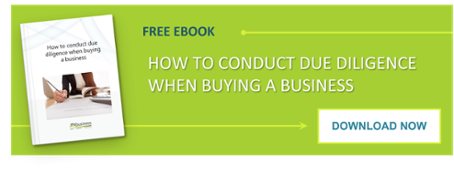
The short answer to this question is yes... and no.
Buying a business that provides you with a good job is definitely a worthwhile strategy, as long as it doesn’t just provide you with a job.
If you own a business, what are the main risks you will be taking?
- Operational risk – As a business owner you count on your systems and processes to work in a predictable manner and accept the risk of those systems and processes failing. For example, your safety system could fail and cause injury to an employee, or your manufacturing system could break down, causing you to default on a major customer contract.
- Market risk – You have to accept, to a degree, the vagaries of the market and how that could impact your business.
For example, homegrown steel manufacturing businesses in Australia have been decimated by an over-supply of steel in China and aggressive, low-cost Chinese imports. These are market forces at work. - Financial risk – If you have borrowed money you are ultimately responsible for meeting your financial obligations. You have also spent money creating a product or service and you need to sell it to a customer. Those customers may pay on time, or they may not pay at all.
- Brand and reputation risk – Every person who works for you and the way in which your business presents its proposition to the market will impact your reputation and brand, and hence your value.
How does this compare to being an employee?
If you are employed in a business you don't ‘own’ those risks. The main risks you take include:
- Contractual and financial risk – As an employee you take the risk that your employer will pay your salary and reward you according to your performance and your contractual arrangements. In the worst case, the company may become insolvent, can’t meet its commitments and you’re out of a job. There are safety nets around entitlements, but that is the worst-case risk.
- Brand and credibility – As an employee you are ‘fixing your wagon’ to the performance and approach of that company in the market, so there is an association risk if it turns sour. The level of risk depends on how senior and/or prominent you are in the business.
- Satisfaction – This is a personal risk and an important one for employees: are you able to satisfy your personal and career ambitions in your employed situation?
In both cases, should you expect the same reward or return for the risks you take?
As an employee you are likely thinking about long-term career development, but your main motivation around risk and return tends to be in the here and now: I’m putting in physical and mental exertion and I expect to be rewarded at market rate for that.
Now think of a business owner who is buying a business to work in it full time. They, too, need to be adequately remunerated for their physical and mental exertion at a market rate, as if they were employed by the company and had no other ties to it.
However they also need to ensure that over and above that remuneration, the business is able to generate a sufficient return for the investment they have made in it.
In effect they are wearing two hats and need to be rewarded separately for each role.
The challenge of wearing two hats
We often advise clients who have bought businesses after being in a long-term employed situation and who are not used to taking on business risk.
For these clients, the concept of wearing ‘two hats’ in their business can be a tricky one.
Many people coming from an employed environment will say things like: “Provided I get a salary of $150,000 a year I don't really care if the business doesn’t earn much more, because we’ll just have to pay tax anyway.”
Our response is: “If you’re paying tax it’s a good thing, because it means you’re making money”, and “if there is no return over your salary, what are you getting for all the risks you are taking as a business owner?”
A 'broad' benchmark for a small to medium-sized enterprise (SME) would normally be a return on your investment of 15%–35% after tax for the risks associated with owning a business, as distinct from being employed (depending on the individual business and sector risks, of course).
A sobering example
Some people buy a business and are happy to get a minimal return, as long as they’re in work and being paid a salary. That is a commercial judgement.
But consider this example:
Imagine you are the general manager of a business you own. You work full-time and receive $150,000 a year for a very meaningful role. You have a car accident on the way to a meeting that leaves you unable to work. You now have to replace yourself with someone else at a market rate.
In that situation, would you still not want a financial return from your business over and above paying that person to do what you were doing?
Our advice is that if you are buying a business to secure yourself a job, please take account of the different risks you are taking on as both owner and employee and ensure your return, in both cases, adequately accounts for those risks.
Think of the business as an investment, not just a job
If you are in the market for a business – and a job – because of redundancy, learn from that experience i.e. nothing is forever and you may or may not have control over your future.
Treat a business purchase as an investment and think upfront about the various exit potentials it may have for you; whether that could be selling to family members, shareholders or outside purchasers.
Even though you don’t envisage selling for many years, that thinking will allow you to better pressure test the value of the business and the opportunity it presents, and ultimately determine whether the business is right for you.
If you would like advice or support with any aspect of buying a business, contact the team at JPAbusiness on 02 6360 0360 (Orange) or 02 9893 1803 (Parramatta) for a confidential initial discussion.
 James Price has over 30 years' experience in providing strategic, commercial and financial advice to Australian and international business clients. James' blogs provide business advice for aspiring and current small to mid-sized business owners, operators and managers.
James Price has over 30 years' experience in providing strategic, commercial and financial advice to Australian and international business clients. James' blogs provide business advice for aspiring and current small to mid-sized business owners, operators and managers.



